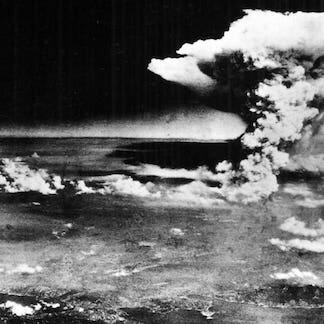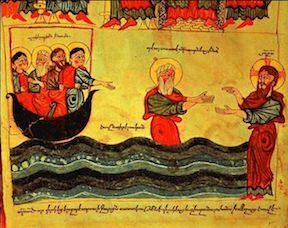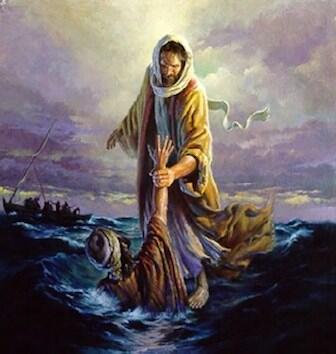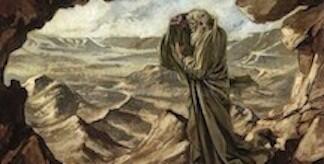 I began writing this homily for the 19th Sunday in Ordinary Time (August 9) on August 6, which is notable in different ways. First, it is the 75th anniversary of the dropping of the atomic bomb on Hiroshima, Japan. Though that bomb, and the one on Nagasaki a few days later, brought an end to the war (even if it was near its end without the bombs), it killed between 90,000 and 146,000 people in Hiroshima, many immediately, but many more due to radiation poisoning the days and years to follow.
I began writing this homily for the 19th Sunday in Ordinary Time (August 9) on August 6, which is notable in different ways. First, it is the 75th anniversary of the dropping of the atomic bomb on Hiroshima, Japan. Though that bomb, and the one on Nagasaki a few days later, brought an end to the war (even if it was near its end without the bombs), it killed between 90,000 and 146,000 people in Hiroshima, many immediately, but many more due to radiation poisoning the days and years to follow.
As for deadly explosions: Let us not forget the terrible explosion in Beirut on August 4 — due not to an act of war, it seems, but to criminal negligence in story explosives in the city – killing over well over 100, wounding 5000 or more, and leaving 100,000 homeless. A sudden blast on an ordinary day.
Second, as I write on August 6, it is also the feast of the Transfiguration. This too is an eruption of sorts, when Christ suddenly revealed the blinding light of his inner divinity to his unsuspecting apostles:
Six days later, Jesus took with him Peter and James and his brother John and led them up a high mountain, by themselves. And he was transfigured before them, and his face shone like the sun, and his clothes became dazzling white. (Matthew 17.1-2)
 Suddenly, for a moment, the three disciples saw Jesus in a very different way, divinity unconcealed. Life quickly returned to normal, as they descended the mountain, but this moment stayed with them, perhaps intensifying their commitment to discipleship.
Suddenly, for a moment, the three disciples saw Jesus in a very different way, divinity unconcealed. Life quickly returned to normal, as they descended the mountain, but this moment stayed with them, perhaps intensifying their commitment to discipleship.
But now we can turn to today's Gospel. The scene is from Matthew 14. It follows upon the feeding of the ten thousand (women and children counted!) we heard last week:
Immediately (after the feeding of the ten thousand) Jesus made the disciples get into the boat and go on ahead to the other side, while he dismissed the crowds. And after he had dismissed the crowds, he went up the mountain by himself to pray.
When evening came, he was there alone, but by this time the boat, battered by the waves, was far from the land, for the wind was against them. And early in the morning he came walking toward them on the sea. But when the disciples saw him walking on the sea, they were terrified, saying, “It is a ghost!” And they cried out in fear. But immediately Jesus spoke to them and said, “Take heart, it is I; do not be afraid.”… (Matthew 14.22-32)
In other words, another theophany: not with explosive force or blinding light, but God intervening once again. The apostles had just seen, but perhaps had not understood, the fantastic act of feeding so many people with just a few loaves and fishes. But now Jesus walks on water and, to make things 100% clear, speaks the words God spoke to Moses at the burning bush (Exodus 3): "It is I" (ego eimi in the Greek). Yet the purpose is a gentle one: Jesus comes to them suddenly in the night, for protection and peace.
In Mark 6, the scene ends with a kind of rebuke of the apostles who cannot see what is before their very eyes:
And the apostles were utterly astounded, for they did not understand about the loaves, but their hearts were hardened. (Mark 6.51b-52)
Matthew softens the scene by a different ending:
When they got into the boat, the wind ceased. And those in the boat worshiped him, saying, “Truly you are the Son of God.” (14.32b-33)
 Try to hold before your mind’s eye all these scenes: the obliteration of Hiroshima, the shattering of Beirut; Jesus shining forth a blinding light on Mount Tabor; Jesus impossibly feeding the hungry; Jesus, God revealed, walking across the waters. Neither nature nor tradition nor teachings nor virtues are enough: when God finally appears, nature is transformed for a moment, God is seen and heard in a very very clear manner. The manifestation of God is terrifying, shocking, but in the end life-giving, God-with-us.
Try to hold before your mind’s eye all these scenes: the obliteration of Hiroshima, the shattering of Beirut; Jesus shining forth a blinding light on Mount Tabor; Jesus impossibly feeding the hungry; Jesus, God revealed, walking across the waters. Neither nature nor tradition nor teachings nor virtues are enough: when God finally appears, nature is transformed for a moment, God is seen and heard in a very very clear manner. The manifestation of God is terrifying, shocking, but in the end life-giving, God-with-us.
Now we could end here, inspired perhaps to pray for openness to God’s unexpected revelations, perhaps wishing too: “May God appear here and now, when more than ever we need God!”
But there’s a catch. Sometimes as least the God who suddenly appears expects more from us. I skipped over a little section of Matthew’s account, a scene missing from the other Gospels. This is what happens when Jesus approaches but before he gets into the boat:
Peter said, “Lord, if it is you, command me to come to you on the water.” Jesus replied, “Come.” So Peter got out of the boat, started walking on the water, and came toward Jesus. But when he noticed the strong wind, he became frightened, and beginning to sink, he cried out, “Lord, save me!” Jesus immediately reached out his hand and caught him, saying to him, “You of little faith, why did you doubt?” (14.28-31)
 Peter both doubts — “if it is you…” — but unlike the other apostles, he puts his life on the line, a mere human imitating Jesus so literally, seemingly too literally. He too walks on the water – until he can’t and starts to sink. The point seems to be: when God appears unexpectedly and unnaturally, then walk toward that manifest God – on land when violence is rife and food scarce, on water when a storm is raging. If you keep your eyes on Christ, Matthew is telling us, you can do the impossible. But once Peter shifts his eyes and starts worrying about the wind and waves, his focus is lost, and he can no longer do the impossible. He needs to be saved from drowning — and Jesus’ gentle, strong, real human hand is right there, to pull Peter out of the water.
Peter both doubts — “if it is you…” — but unlike the other apostles, he puts his life on the line, a mere human imitating Jesus so literally, seemingly too literally. He too walks on the water – until he can’t and starts to sink. The point seems to be: when God appears unexpectedly and unnaturally, then walk toward that manifest God – on land when violence is rife and food scarce, on water when a storm is raging. If you keep your eyes on Christ, Matthew is telling us, you can do the impossible. But once Peter shifts his eyes and starts worrying about the wind and waves, his focus is lost, and he can no longer do the impossible. He needs to be saved from drowning — and Jesus’ gentle, strong, real human hand is right there, to pull Peter out of the water.
For us, the real challenge is not simply to lament the violent intrusion of the destructive, nor to think fondly of the presence of God, but to realize we can do more than is possible on our own: if Christ is really present, even just once in a while, then we too can take our bits of fish and bread and feed thousands; we can stop cowering in our boats and walk impossibly across the waters, facing up to the storms swirling around us.
Note: I can’t help adding a side-note here. In foolishly venturing to walk on the water – as a crazy holy person might – Peter is exemplifying what Cardinal Emmanuel Suhard (1874-1949) of Paris meant when he defined witnessing to Christ (being a saint) in this way: "To be a witness does not consist in engaging in propaganda or even in stirring people up, but in being a living mystery; it means to live in such a way that one’s life would not make sense if God did not exist.” (This passage was a favorite of Dorothy Day’s. The Cardinal's other famous insight is also worth hearing: “One of the priest’s first services to the world is to tell the truth.”)
But perhaps walking on water is not for you (or me) right now. If you want to meditate on a still simpler but very powerful appearing of God, go to this week’s first reading from I Kings 19. It is an understatement to say that the chapter has a complicated context. Elijah has just killed 400 pagan priests, and now the wicked Queen Jezebel, wife of the wicked king Ahab, is hunting for Elijah, to slaughter him in turn. He flees, is cared for by God (who sends an angel with freshly baked bread and pure water), and ends up at Mount Horeb (probably Mount Sinai, where Moses met God). He does not know what to do next, but God is manifest to him in the extraordinarily ordinary way:
God said, “Go out and stand on the mountain before the Lord, for the Lord is about to pass by.” Now there was a great wind, so strong that it was splitting mountains and breaking rocks in pieces before the Lord, but the Lord was not in the wind; and after the wind an earthquake, but the Lord was not in the earthquake; and after the earthquake a fire, but the Lord was not in the fire; and after the fire a sound of sheer silence. When Elijah heard it, he wrapped his face in his mantle and went out and stood at the entrance of the cave. (I Kings 19.11-13)
No wind, no fire, no earthquakes, and no blinding lights, no heavenly voices even. Just a very faint sound, what is here translated as “a sound of sheer silence.” Then Elijah speaks with God, and knows what to do, where to go next.
 All the stereotypes about God’s appearing are here put aside, in order to hear God in the simplest of sounds, the whisper of a whisper. For this, we needn’t try to walk on the water; we just need to be very, very quiet and wait. (Though perhaps being very quiet and waiting is harder than walking on water?)
All the stereotypes about God’s appearing are here put aside, in order to hear God in the simplest of sounds, the whisper of a whisper. For this, we needn’t try to walk on the water; we just need to be very, very quiet and wait. (Though perhaps being very quiet and waiting is harder than walking on water?)
Even simpler: if you like the theme of the divine simplicity, be sure to listen to the “Simple Song” that comes at the start of Leonard Bernstein’s Mass (which opened the Kennedy Center in Washington DC in 1971). The heart of the song: “God is the simplest song of all.” You can find a number of versions on the web, but try this version, Victor Starsky singing, or this one by the glorious opera singer, Renée Fleming.

